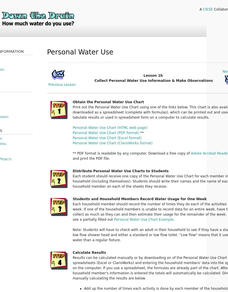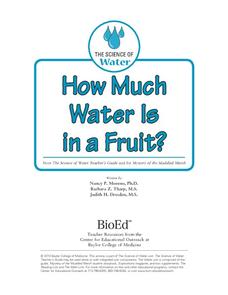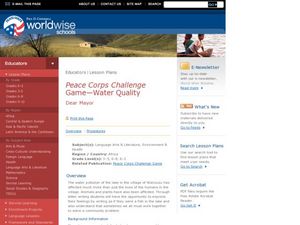Environmental Protection Agency (EPA)
How Much Water Do You Use?
Incorporate reading strategies, math, research, and the scientific method into one lesson about water conservation. After reading a story about a landlady trying to determine how many people are living in an apartment, learners develop a...
Curated OER
Down the Drain: How Much Water Do You Use?
Participate in an Internet-based project to share information about water usage with other students. Collect information about water usage and compare it to the average used by people in other parts of the world.
Baylor College
How Much Water Do Humans Need?
Physical or life science learners measure the amounts of water eliminated by intestines and the urinary system, and the amounts lost via respiration and perspiration. In doing so, they discover that the body's water must be replenished...
Curated OER
Pollution and Environmental Studies- Daily Water Use
In this environmental studies worksheet, students create a data table to discover how much water each person uses on a daily basis and what it is used for. They complete a post activity to make and test solutions for pollution using a...
PricewaterhouseCoopers
Conservation: Water
Here is a fantastic experiment-based lesson on water conservation, waste, and filtration. The lesson plan is well-developed and provides background information, discussion leads, and six scripted lab activities anyone can do. The class...
Baylor College
How Much Water Is in a Fruit?
Compare the volume of an orange to the volume of liquid that can be extracted out of it. Also compare the mass of an apple before and after it has been dried out. In both of these activities, children find that there is an appreciable...
Beyond Benign
Water Bottle Unit
How much plastic do manufacturers use to create water bottles each year? The class explores the number of water bottles used throughout the years to determine how many consumers will use in the future. Class members compare different...
Curated OER
The Water Cycle
Your class sets up a mini water cycle model to examine the process. Then they watch an animation, following a water molecule through the cycle. A well-developed lab sheet guides learners through the lesson and a PowerPoint presentation...
Curated OER
Do You Waste Water?
For this water usage worksheet, students will keep track of how much water is used in their home over a weekend. Students will use a chart showing the average amount of water used for different activities to calculate how much water they...
American Museum of Natural History
What Do You Know About Archaeology?
A 10-question interactive permits young anthropologists to study the field of archaeology and the tools archaeologists use to dig into history.
Curated OER
Taking Account of Water
Students discover how much water they actually use and investigate the need for water conservation.
Curated OER
How Much Are We Using?
Third graders investigate environmental stability through consumption and recycling. They look into how much of a recyclable good it takes to create one new product. Pupils compile a list of these quantities, then create posters that are...
Curated OER
Water Meter Reader
Junior high schoolers learn how to read a water meter, track their family water usage, and discuss the amount in class with other pupils. They will interpret real-world data and graph it. It is ideal for increasing awareness and...
Curated OER
Earth's Water: A drop in your cup
Students complete activities where they observe the amount of freshwater in the world as a fraction of the actual amount of water using different mixtures. In this freshwater lesson plan, students brainstorm on how to preserve freshwater.
Serendip
How Do Biological Organisms Use Energy?
When an organism eats, how does food become energy? Young biologists follow glucose through the process of cellular respiration to the creation of ADP using a discussion-based activity. The resource also highlights conservation of mass...
Teach Engineering
Water Remediation Lab
Water filtration — that's pure genius! Groups test the ability of a water filter to purify water by running chlorine contaminated water through a filter and measuring the chlorine concentrations as they filter the water. They then graph...
Curated OER
"Water Has Many Uses" Mini-unit
Young scholars understand the importance of water as a resource in our lives. For this water mini-unit students recognize that not all countries have water available as we do. Young scholars discuss and explain a plan for...
American Museum of Natural History
What Do You Know About Astronomy
Develop an understanding of the universe. Learners answer 10 multiple choice questions about several topics in astronomy. Questions contain information about the age of the universe, gravitational attraction, galaxies, planets and comets...
Curated OER
Peace Corps Challenge Game- Water Quality
Students advocate for clean water. For this water pollution lesson, students play the Peace Corps Challenge Game, discuss the effects of polluted water and write a letter to the mayor of Wanzuzu highlighting the situation of the fish's...
Curated OER
How Much Electricity Do You Use Each Year
Students relate the usage of common household appliances to coal usage. They examine the example of how much coal is used each year by a typical family of four to operate various appliances.
Curated OER
The Water Cycle - Main Components
Present the water cycle to your middle schoolers with this lesson. After an anticipatory set, they participate in a Q & A session about the terms associated with the water cycle: evaporation, transpiration, condensation, and...
Curated OER
How Do You Know?
What is the difference between primary and secondary sources? Help your middle schoolers develop a knowledge of appropriate sources to use when doing accurate research. They develop unique ways to incorporate literature in historical...
Cornell University
Buoyancy
Swimmers know to float by turning their bodies horizontally rather than vertically, but why does that make a difference? In an interesting lesson, scholars explore buoyancy and the properties of air and water. They test cups to see which...
K-5 Math Teaching Resources
Adding Mixed Numbers (Unlike Denominators)
Mix things things up in your elementary math class with a series of problem-solving exercises. Presented with a series of mixed number word problems, young mathematicians are asked to solve them by using either visual fraction models or...

























